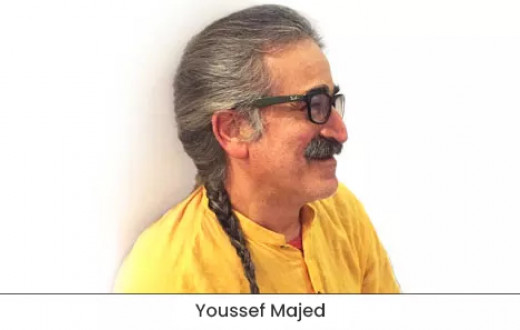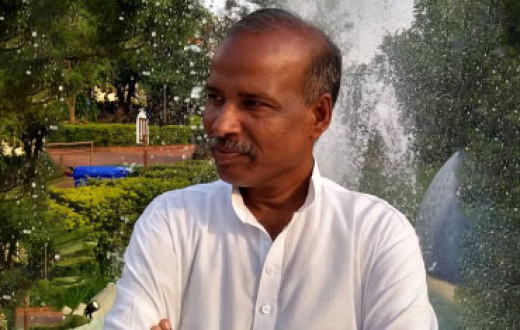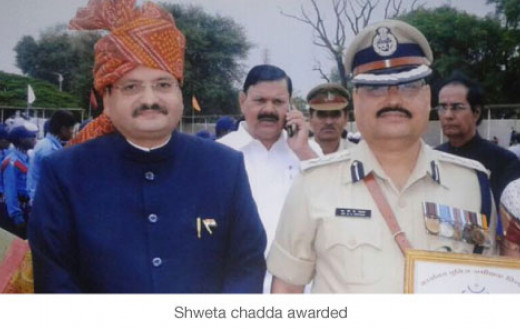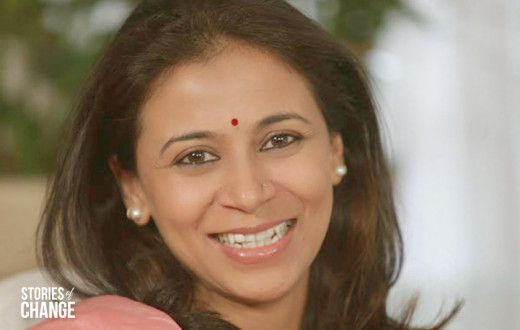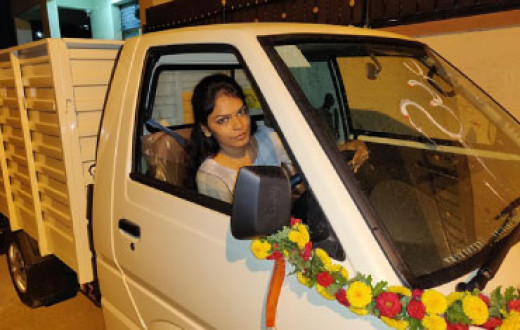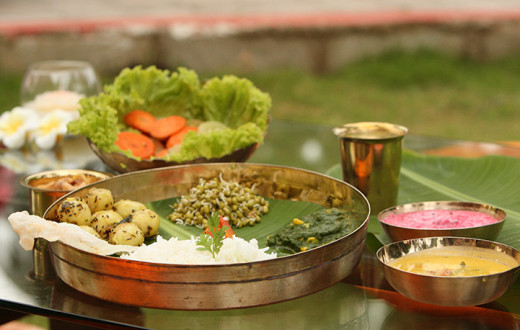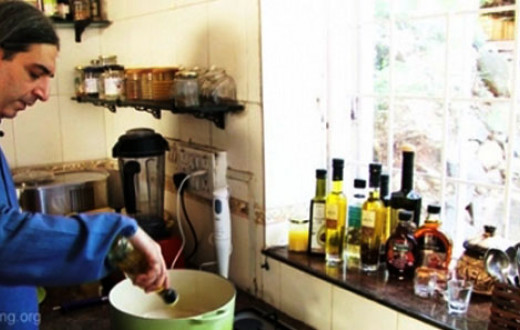A farmer does not grow crops. A farmer creates an environment where crops can grow.
Dr. Ranjana G Borse is an ophthalmologist who treats the eyes of patients while also diagnosing their overall well-being. This unique inclination brings her to the doorsteps of Seva projects, where she guides people beyond the health of their eyes. She cares about what her patients are eating. I named the approach of her Seva project “farm to fork”.
 On a typical Sunday, the doctor couple (Dr. Ranjana, Ophthalmologist & Dr. Girish Tulsiram Borse, Pediatrician) enjoys farming on 11 acres of land instead of watching a movie or visiting a shopping mall.
On a typical Sunday, the doctor couple (Dr. Ranjana, Ophthalmologist & Dr. Girish Tulsiram Borse, Pediatrician) enjoys farming on 11 acres of land instead of watching a movie or visiting a shopping mall.
In 2012, when Dr. Ranjana was working on the water crisis, it occurred to her that the crisis was related to the extensive use of the chemical farming technique.
Set an example for others to follow
“What is needed today is reaffirming faith in natural farming,” says Gurudev Sri Sri Ravi Shankar.
 According to a saying, “Set an example for others to follow.” For a few generations, farmers have been into chemical farming. So, persuading them to restart natural farming would require more than just convincing words. Dr. Ranjana decided to set an example.
According to a saying, “Set an example for others to follow.” For a few generations, farmers have been into chemical farming. So, persuading them to restart natural farming would require more than just convincing words. Dr. Ranjana decided to set an example.
Almost five years ago, Dr. Ranjana started natural farming with the full support of her husband. “From the very first day, we did natural farming on 11 acres of farming land,” Dr. Ranjana shares with pride. With firm belief, she says, “I knew that when farmers observe us successfully farming without the use of pesticides, insecticides, etc., and still save money, they will switch from chemical farming to natural farming with ease.”
“Sunday Farmers”

Dr. Ranjana recalls with a smile, “Those were the days of learning new things and overcoming the teething problems of farming. We used to do homework throughout the week to learn about natural farming. Then implement the learnings on the farm on Sundays. So at home, we call ourselves ‘Sunday farmers’.”
 Dr. Ranjana being soaked in the knowledge and experience of natural farming, proudly shares, “We never used chemicals on our land. The first year was a learning year. Desi cow dung, cow’s urine and buttermilk made from desi cow’s milk are used primarily in natural farming. Only when insects were destroying our crops did we spray neemastra (a mixture of neem leaves, cow dung, cow’s urine and water). All this has made our land fertile. All kinds of crops are grown periodically.”
Dr. Ranjana being soaked in the knowledge and experience of natural farming, proudly shares, “We never used chemicals on our land. The first year was a learning year. Desi cow dung, cow’s urine and buttermilk made from desi cow’s milk are used primarily in natural farming. Only when insects were destroying our crops did we spray neemastra (a mixture of neem leaves, cow dung, cow’s urine and water). All this has made our land fertile. All kinds of crops are grown periodically.”
On being asked how she manages the crops on 11 acres of land, Dr. Ranjana happily replies, “We appointed two families to work on the fields. We have trained them to do farming.”
Dr. Ranjana, a guide to the farmers

“The nearby farmers saw us do natural farming and reaping rich produce. Then we organized Subhash Palekarji’s six days of free training for them. He was an awardee of Padma Shri in 2016. We realized that natural farming needs to spread nationwide. So we started organizing meetings with the farmers in our neighboring villages. Subhashji explained in depth the importance and technique of natural farming. Eight hundred farmers enthusiastically joined the training program,” explains Dr. Ranjana.
To benefit the maximum number of farmers through the training program, she and her husband did one of the tedious jobs. They visited door to door in various villages. Nothing can substitute “leg work”.
Dr. Ranjana, a storyteller, reinforces natural farming
With love and gratitude to Lord Krishna, Dr. Ranjana recalls an inspiring story for the farmers. Lord Krishna, living in a flood-stricken village, guides the villagers to use cow-dung and urine to revive land fertility. During the flood, soil erodes to seep away from the fertile land. With cow-dung and urine, a rich crop yielded in the village.
Challenges faced by Dr. Ranjana
Speaking on the challenges faced, Dr. Ranajana says, “Farmers adopted natural farming on the trust that they would sell their farm produce and make a living. But the reality was that we needed more marketing”. Fortunately, they came across an admirer of desi cows who happened to be a medical representative. She adds, “He wished to do something for the cows. Natural farming minus desi cows is impossible to sustain. He proposed to market the natural produce of the farmers.” She was relieved.
Dr. Ranjana, a team builder

The clinic run by the doctor couple has a shop in the basement. The marketing department is set up there.
Dr. Ranjana provides details of “farm to fork”, “The farm produce (pulses, cereals, fruits, vegetables, cold press oil, etc.) brought by farmers and our farm produce is in this shop. Thus, under one roof, all-natural farmed products are displayed for sale. Desi cow’s milk is home-delivered from here. The scarcely found Desi cow’s paneer is also in our shop. Desi cow’s buttermilk and pure ghee prepared by the farmers at home are brought here to sell.”
She happily adds about the customer network, “Deepak Sonar has an affection towards desi-cows. He understands that desi cows are interdependent on natural farming, and so he is keenly devoting his time to marketing the natural produce of farms. We have eight WhatsApp groups where we can reach out to customers with ease. He helps in maintaining these groups. He adds the daily list of available farm products with rates in all the groups. Accordingly, orders come for home delivery. Many customers also visit our shop to purchase this natural produce. Deepak is shouldering the responsibility of marketing the farmers’ produce to reach the customers.”

She appreciates the additional efforts put in by Deepak in bringing the best quality items from different places near Jalgaon. She exemplifies, “For instance, grapes from Sangli and Solapur are much better than those from Jalgaon. So they procure grapes from the farmers of Sangli and Solapur, who have adopted natural farming.”
Dr. Ranjana says, “Increase in awareness about natural farming is required. It is only a start.”
In my opinion, Dr. Ranjana and her team have done the foundation work and are expanding each day with new, healthy and happy customers.
The primary reason for the increase in diseases among villagers is due to nutritionally inadequate and unbalanced diets and also due to the toxic and poisonous food from the chemical farming produce. Villagers eat proteins negligibly in comparison to the urban population.
Dr. Ranjana is an inspiration to homemakers
Her terrace garden is a miniature farm



What keeps Dr. Ranajana going despite all the odds?
Explaining these facts and lessons to farmers and convincing them to switch to natural farming is easier said than done. Dr. Ranjana is full of patience and determination. She says, “The regular practice of Sudarshan Kriya has contributed to making me strong and patient, skillful and successful.” “I do these Seva projects with Gurudev’s inspiration,” she emphasizes.
Ranjana puts forward these thoughts before the farmers, customers and people in general so that as Indians, we come back to a healthy lifestyle and a disease-free society.
Related link:
“An eye doctor’s determination to save lives outside her practice.” How the US-based NRI makes a difference to their native village in Maharashtra. The setting was rustic. Find how Dr. Ranjana managed the water crisis by implementing the Shirpur pattern.
FAQs
The British introduced chemical farming in India to use the raw materials and infrastructure of bomb production established in India. They understood that the foundation of self-sufficiency for Indian states is in agriculture. Agriculture based on natural farming. Desi cows are an integral part of Natural Farming. They introduced slaughterhouses to decrease the number of desi-cows and make India dependent on pesticides and fertilizers. So they minted money on the slavery of Indians. It is high time we wake up and shake ourselves. Dr. Ranjana explains in detail, “Initially, chemical farming seemed to be giving a high yield as the soil was still fertile. But with repetitive chemical farming, the quantity of fertilizers sprayed on the crops increased as the soil fertility began depleting. The bacteria present on the roots were destroyed by the chemicals. The natural soil fertility was thus lost.”
In the yesteryears, farmers used to grow moong, urad, or tuhar in-between the cotton crops. Now they are adopting mono-cropping. With no dal (pulses) produced from their fields, they avoid the purchase of dal as they have to spend more money. Hence, pulses are not part of their daily diet. They have dal-rice only once a week. Their proteins intake is low resulting in swelling, fatty liver, skin degeneration, increase severity of infections, and stunted growth in children. In the fields, large trees grew on the baand or dyke. But under the shadow of these trees, crops cannot grow. So the farmers started cutting down these trees to increase the area of the croppable field to yield more crops. But this led to a lesser number of fruit trees. As a result, fruits are served only to villagers who are ill.
The more the use of chemical fertilizers, the lesser is the fertility of the soil. Farmers are unaware that it is the soil bacteria that make their soil fertile. The extensive use of chemicals destroys the bacteria in the soil, resulting in a reduction in soil fertility. Lesser the soil fertility more chemical fertilizers are used to get better yield. Input cost has increased. Seeds, chemical fertilizers, etc. prices have increased. Farmers are unable to earn a lucrative price for their produce. All this results in the rise of farmer suicides. It is a vicious cycle. Farmers are growing only cash crops like cotton, maize, soya bean, sugarcane, etc. Their yield is animal-oriented and not human. They grow crops that pay them better.
Dr. Ranjana has significantly inferred from a survey that villagers are dependent only on ‘sabzi roti’ (veggies and whole wheat thin pancakes). Long back, they used to have bhakri made of jowar or bajra. The glycemic index is lower than wheat rotis. So bhakri manages diabetes, unlike wheat rotis.
Dr. Ranjana shares her in-depth knowledge on the basics of plant growth: 98% of a plant's growth is through water, air and sunlight. Say, if you take 10 kg of soil to grow a bottle-gourd creeper, it may yield 7-8 pieces of gourd of 2 kg each approx. So you gain 16 kg gourd out of 10 kg soil. The weight of the soil after plucking out the vegetables remains the same. It means 98% of the weight of the vegetables grown has come from sunlight, carbon dioxide, oxygen and water. The other 2% comes from nutrients and minerals in the soil. The plant requires 110 nutrients (macro and micro) present in the soil. Thirty nutrients are essential. But farmers who adopt chemical farming put only N, P, K (Nitrogen, Phosphorus, Potassium), and a few trace elements (like zinc). So the million-dollar question is - How will the plant fulfill its minimum requirement? Unfortunately, your veggies will not give you the minimum nutrition. Bacteria present on the roots simplify the complex form of soil nutrients for the plant to absorb. In return, the bacteria get juices from the plant roots. It is a Win-Win situation for the plant and the bacteria. Finally, what we eat from chemical farming are big, colorful veggies, that have fewer nutrients and minerals. Don’t you think we should stop eating ‘bundles of pesticide/insecticide’ stuffed in fruits & veggies?
Dr. Ranjana says, "On plucking out the veggies or crops from the plant, its stems and leaves remain. In chemical farming, the remains of the crop are burned. In natural farming, this is left on the land to decay. It maintains the organic carbon (12-15%). This organic carbon maintains the fertility of the land. With more and more chemical farming, organic carbon is as little as 0.2-0.3%.” Isn’t this alarming? If organic carbon dips below 0.2%, the land fertility cannot revive anymore. Such is the case of lands in Western Maharashtra. It is one of the main reasons for the suicide of farmers in Maharashtra. Now I understand why Dr. Ranjana’s mission is to bring happiness to the lives of farmers.
Dr. Ranjana says. “10 grams of desi cow dung has 300-400 crore bacteria.” Desi cow dung is the perfect solution for the fertility of barren land. But the reduced availability of desi-cows is due to an increase in slaughterhouses to meet the rising demand for meat. Subhash Palekar’s research provided a solution: In 200 litre water in a drum, add 10 kgs of cow dung, 5 litre cow’s urine, 1 kg pulse flour (mung, tuhar, chana), 1 kg jaggery powder and chemical-free soil from baand (dyke). Stir it a few times a day. Now bacteria multiply, the soil full of minerals and nutrients. I was amazed to know this, are you?




